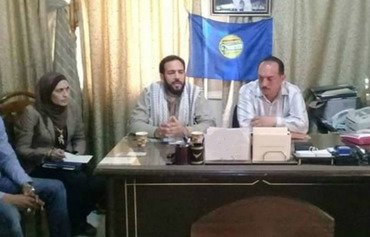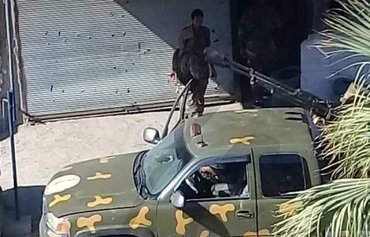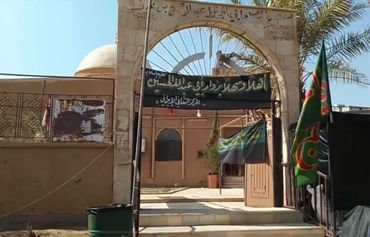Iran's Islamic Revolutionary Guard Corps (IRGC) has been stoking sectarian tensions in the areas under its influence in Syria, particularly in Homs, Aleppo and Deir Ezzor provinces, an activist told Diyaruna.
It is doing this through its persistent push for demographic and religious change that threatens to alter the original character of these areas, he said.
The IRGC has expanded its area of influence in Deir Ezzor through affiliated militias and by establishing offices that promote the doctrine of Wilayat al-Faqih (Guardianship of the Jurist), Deir Ezzor activist Jamil al-Abed told Diyaruna.
This requires that people in the IRGC's areas of influence pledge allegiance to al-Wali al-Faqih -- Iran's Supreme Leader Ali Khamenei -- who is the top and sole authority over the IRGC.
![Young men from Homs take part in a group wedding ceremony that was funded by Lebanon's Hizbullah, with the expectation that bridegrooms would join the militia. [Photo courtesy of Jamil al-Abed]](/cnmi_di/images/2018/12/03/15597-Ghafari-Aleppo-militia-600_384.jpg)
Young men from Homs take part in a group wedding ceremony that was funded by Lebanon's Hizbullah, with the expectation that bridegrooms would join the militia. [Photo courtesy of Jamil al-Abed]
![A religious shrine built by the IRGC has drawn Iranian visitors to Deir Ezzor. [Photo courtesy of Jamil al-Abed]](/cnmi_di/images/2018/12/03/15598-IRGC-religious-shrine-600_384.jpg)
A religious shrine built by the IRGC has drawn Iranian visitors to Deir Ezzor. [Photo courtesy of Jamil al-Abed]
According to al-Abed, residents of Deir Ezzor had not experienced problems with sectarianism in the past, since such topics were considered "unseemly to discuss".
Now, however, the issue has become a point of tension, he said, as it is presented in provocative ways, such as through the forcible imposition of ideas and exploitation of the economic and political vulnerabilities of civilians.
Attempts to influence civilians
In recent days, the Iranian Cultural Centre in Deir Ezzor has been distributing propaganda to civilians and schoolchildren, and putting up posters that glorify the IRGC, al-Abed said.
This follows an announcement made by IRGC-affiliated Syrian tribal leader Sheikh Nawaf al-Bashir, that Abu Abed mosque in central Deir Ezzor city has been designated as a shrine and hawza (seminary) for Iranian and Iraqi pilgrims.
Al-Abed said the situation is similar in Homs, where the youth are being wooed by Iranian interests with financial enticements.
A group wedding funded by Lebanon's Hizbullah, for a number of youth in the area, was recently held in the Homs village of Kafr Abed, he said, with the expectation that the bridegrooms would be joining Hizbullah’s ranks.
Hizbullah covered all wedding costs, he said, and the ceremony was attended by a number of party and IRGC commanders in the region.
Aleppo is facing a similar cultural invasion, he said, as IRGC-affiliated militias have converted the Urwat al-Bar mosque to an advocacy and media centre.
In the past, most people were accepting of others, regardless of their religious or sectarian affiliation, al-Abed said.
But as the IRGC continues to make these moves, he added, sectarian tensions have begun to rise, pointing to more serious developments to come.

![IRGC commander Brig. Gen. Javad Ghaffari, who oversees all militias Iran has formed to fight on its behalf in Syria, is seen among elements of his militias in Aleppo. [Photo courtesy of Jamil al-Abed]](/cnmi_di/images/2018/12/03/15596-Sayed-Javad-Ghafari-600_384.jpg)






